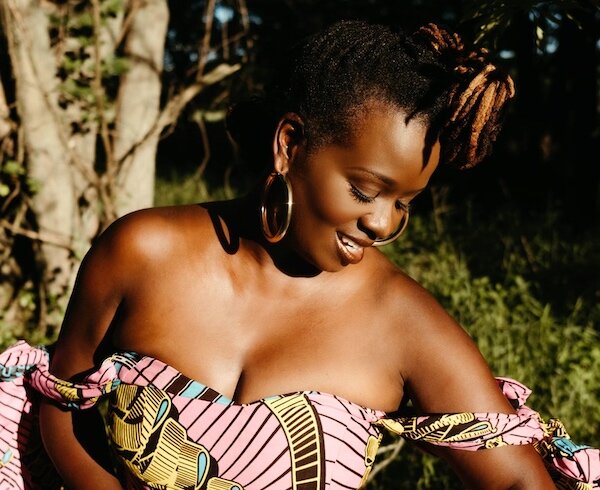(Reprinted from 25 August 2020 Downbeat online magazine)
New York-based vocalist Somi thought that her May 2019 date with the Frankfurt Radio Big Band in Germany was just a gig—an exciting one.
It was her first performance ever with a big band, and world-renown pianist John Beasley had prepared the arrangements for two sets of her original material. The thought crossed her mind that the gig would make for a nice live recording—German public radio was taping the performance for national broadcast—but she was booked for the following two years. Before she’d have time to undertake such a release the show would be old news, she thought.
“Then the pandemic hit,” Somi recalled in a July Zoom call about Holy Room: Live At Alte Oper With Frankfurt Radio Big Band, the first release on her new label, Salon Africana. “I thought it would be wonderful [to release the recording], and I felt very fortunate to have it. I was quite overcome when I listened to it, because I miss performing so much. I could feel the energy, the centering that happens on stage. The magic.”
For the Frankfurt performance, Somi had fashioned two sets of material from several of her albums, each one an ever-more-personal expression of her multifaceted artistry. From her official 2007 debut, Red Soil In My Eyes, for instance, she took “Ingele,” a lilting, Swahili-language original that shows off the striking expressiveness of her impressive vocal range. As the band explodes in rhythmic abandon, she moves naturally from languid, legato phrases into whelps, calls and shouts—tricky vocal interjections that speak as much of Somi’s sophisticated musical heritage as of magic.
“That particular album was about owning the African side of myself in the music,” she said. “It allowed me to play with all of that color in a fuller way. As somebody who grew up in several different places, with many influences, [my music] is never going to stagnate in tradition. This was my first attempt to create a bridge between my world and my point of view.”
Her world is inarguably vast. The daughter of a Rwandan father and Ugandan mother, she lived part of her childhood in Zambia and in Illinois. She traveled on an anthropology research fellowship to Kenya and Tanzania after earning her bachelor’s degree. Somi went on to get a master’s at the prestigious NYU Tisch School of the Arts, and then moved to Nigeria for 18 months of independent field work. Next, she returned to New York and took up residence in Harlem, a place undergoing rapid social changes. Her point of view—informed by research and expressed through art—takes into account all of these influences.
“I’m just naturally a hyphenated person,” she observed. “So, I’ve decided to lean into the ‘in between.’”
From her first album for Sony/Okeh in 2017, The Lagos Music Salon, Somi pulled some of her program’s most engaging tunes—“Last Song,” an anthem for the unabashedly enamored; “Two-Dollar Day,” an unflinching commentary on economic privation; and “Lady Revisited,” her irrepressible ode to Nigerian Afrobeat innovator, Fela Kuti. These tunes, unintentionally “auto-ethnographic,” Somi said, owe much to her ability to communicate visceral realities through storytelling.
“For me, [that album] was about giving everyone the sense of my journey to Lagos, to present a more nuanced side of a major African city,” she explained. “I loved Lagos.”
Somi’s attachment to Nigeria led indirectly to her second album for Sony/Okeh, Petite Afrique, which won the NAACP Image Award for Outstanding Jazz Album in 2018. Named after a Francophone subsection of Harlem, the album takes on the disruption that economic instability has caused the African immigrant community there.
“[That community] reminded me of the sacrifice that my own parents made as immigrants to this country,” Somi explained. “I was really frustrated with the fact that Harlem was rapidly gentrifying. I kept thinking about the quiet erasure that was happening.”
These tunes, an artistic stand against cultural erasures, make up most of the new album. Among them are Somi’s hard-hitting, horn-blasting challenge to societal notions of racial identity, “Black Enough,” and her mournful reflection on the loss of home, “Like Dakar.”
Petite Afrique also gave the new album its title cut. But “Holy Room,” a majestic musical meditation, has taken on added meaning since the onset of the pandemic. In naming the new album, Somi “was thinking about the sacredness of these cultural spaces that are now sitting silent,” she said. “It’s such a heartbreaking sound.”
One of those silent cultural spaces is The Repertory Theatre of St. Louis, where Somi was booked in March to premiere Dreaming Zenzile, her stage musical on South African singer Miriam Makeba, an unheralded pioneer of African popular music. “Everybody should know who she is,” Somi said. “She was the first African artist to have huge, global commercial success.”
As Somi ponders what might constitute success during a global lockdown, she remains committed to providing a platform that features African voices. So, as an emerging philanthropist, she said, she’ll be donating a percentage of the Holy Room proceeds to the Black Art Futures Fund: “I wanted to help a national, interdisciplinary organization that fosters narratives from the African diaspora. This was one that I found. The only one.” DB
Photo: Anna Longworth
